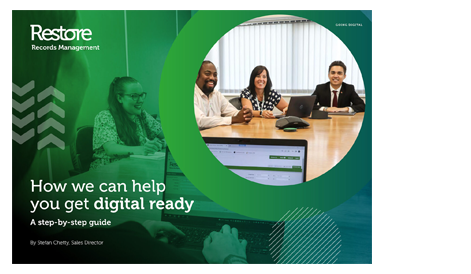
Hybrid solutions and a paperless NHS
Are hybrid and paperlite solutions the key to the age-old dream of a paperless NHS?
In the quest for a paperless NHS, a surprising revelation is emerging in 2023: the coexistence of digital and paper records can revolutionise patient care with unparalleled efficiency.
If that sounds like a disappointing ‘big reveal’ for those who dreamt of an entirely digital service by 2020, then it shouldn’t do – because it’s a solution rooted in reality and one which sets us on a smoother path to a digital future.
Stefan Chetty,
Director of Public Sector Services, Restore Records Management
Digitising NHS Records is a Challenge
For most Trusts, the sheer volume of records makes scanning everything cost-prohibitive, with the majority housing over a million records – and the larger ones considerably more. Our estimate, based on our wide experience of working in the sector, is that reliance on paper in the NHS has reduced from around 70% to almost 50%, but it certainly hasn’t gone away.
The focus has been on ‘going digital’ but there’s a middle ground to aim for. For the majority of Trusts, it would cost tens of millions of pounds to scan all their documents at a cost of £10-£15 a record, when all costs are considered.
Even some of those who in the past wanted to be exemplars of going digital didn’t think about data capture. Many scanned records to view as a PDF on a screen but the result was often more clunky than a paper folder – scrolling through a 200-page PDF isn’t always easy.
A scan-on-demand or ‘digital delivery’ service is better and more cost-effective – because many records stored are never or rarely needed. The key lies in a pivotal shift where clinical staff gradually break free from paper records.
As a result, many Trusts are now embracing progress rather than abandoning paper altogether, allowing for the harmonious coexistence of physical and digital records.
Successful Implementation
We are seeing examples of this all the time, including our projects with University Hospitals Coventry and Warwickshire, Hillingdon Hospitals NHS Foundation Trust, South Tyneside and Sunderland NHS Foundation Trust and County Durham & Darlington NHS Foundation Trust. (CDDFT).
CDDFT had over 900,000 patient files stored in different filing systems across five locations, so a centralised digital system was required to enable clinicians to rapidly retrieve and transfer medical files at the point of care.
Our team of specialists worked alongside the Trust to move these records to a Restore facility. In full consultation with the Trust, a scan-on-demand solution was implemented, and 366,000 patient files were scanned within 12 months.
The result? Record retrieval volumes reduced from 2,000 to 42 files per day since the implementation of on-demand scanning, saving money in the process.
A Bespoke Approach
In the end, finding a cost-effective approach to manage patient records while enhancing patient care is the priority – for which there’s no one-size-fits-all solution.
Each Trust has unique challenges and legacy systems to address. However, for Trusts grappling with significant paper inventory, embracing a hybrid model is a powerful step towards becoming ‘digital ready’ for the future.
Looking to adopt a paperlite, hybrid approach? Find out how we can help you.
Further insights



